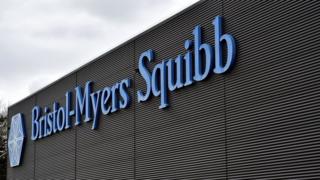Bristol Myers and Celgene in $74bn pharmaceutical merger

Image copyright
Getty Images
Two of America’s biggest drug companies have announced a blockbuster merger.
Bristol-Myers Squibb is buying rival Celgene in a cash and stock deal valued at about $74bn (£58.8bn) or $90bn including debt.
The tie-up, which is subject to various approvals, is expected to be completed in the second half of 2019, will unite their portfolios of cancer-fighting drugs.
It comes as both companies face increased market pressure.
Celgene, based in New Jersey, had more than $11.2bn in global sales in the first nine months of 2018, up about 18% on the year before.
But the firm is fighting to preserve its patent for Revlimid, a cancer drug that accounts for about 60% of its sales.
Pipeline
Bristol Myers, whose headquarters are in New York, boasted more than $16bn in revenue in the first nine months of 2018, up 8% from 2017.
It has seen recent research setbacks tied to its leading cancer medicine, Opdivo.
Bristol chief executive Giovanni Caforio said the deal would take his company to the “next chapter”.
The combined firm will boast nine medicines that each generate more than $1bn in annual sales.
It will also have a broad pipeline of drugs in development, including six that could launch in the next one to two years, with the potential for $15bn in revenue.
“This deal is really all about the launches,” Mr Caforio said on a call with financial analysts.
“Given the number of short-term launches and growth opportunities, we believe this is the right time.”
He added that his team had reviewed the Revlimid patent dispute and was confident in the valuation.
The deal values Celgene more than 50% higher than its market worth before the merger announcement.
But Bristol shareholders appeared unconvinced. The firm’s share dropped 12% on the news, while Celgene’s stock jumped 25%.
If completed, Bristol shareholders will own about 69% of the new company, with Celgene shareholders having the remainder.

